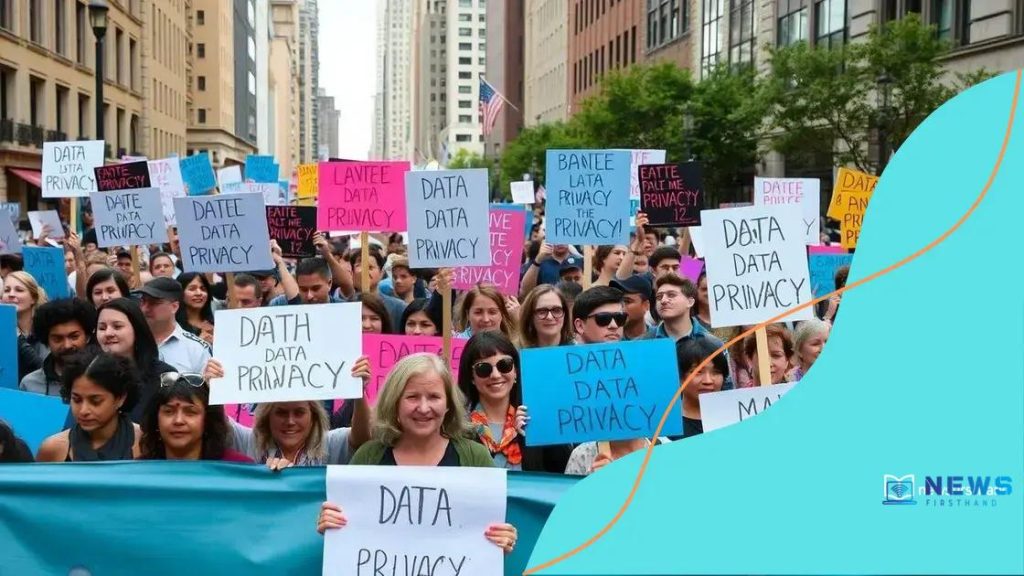Protests defending online data privacy are escalating

Protests defending online data privacy are driven by increased awareness of data exploitation, demand for stricter regulations, and the impact of technology on personal data protection.
Protests defending online data privacy have emerged as a powerful movement reflecting society’s concerns over digital rights. Have you ever wondered how your personal data is being used and shared? In this article, we’ll delve into the reasons driving these protests and what they mean for our digital landscape.
Understanding the current state of online data privacy
Today, understanding the current state of online data privacy is essential for everyone. With technology advancing quickly, people are becoming more concerned about how their information is used.
What is Online Data Privacy?
Online data privacy refers to the way individuals control their personal information on the Internet. It includes everything from the data we share on social media to the information collected by websites.
Why Is It Important?
Protecting our data ensures that personal details remain confidential. A breach can lead to identity theft, financial loss, and even damage to one’s reputation.
- Personal Identity Security
- Preventing Fraud
- Maintaining Trust in Online Services
Many people share their lives online, but data privacy is often overlooked. Companies may track user activity, selling that data without consent. This raises serious ethical issues.
The Role of Legislation
Governments are stepping in with rules to protect citizens. For instance, laws like the General Data Protection Regulation (GDPR) in Europe aim to enforce strict data protection measures.
Many consumers may wonder how these protections apply to them. If you live in a place with strong data privacy regulations, your information may be safer. Understanding your rights is key to safeguarding your personal information.
Key reasons behind the protests
The protests defending online data privacy are driven by several key factors that reflect public concerns. As people become more aware of data collection practices, the desire for control over personal information grows stronger.
Increased Awareness of Data Exploitation
Many individuals now understand how companies gather and use their data. This awareness has sparked outrage, pushing people to demand more transparency and accountability from these organizations.
- Data breaches exposing sensitive information
- Targeted advertising that feels invasive
- Unclear privacy policies
Additionally, numerous high-profile cases have shown the risks associated with inadequate data protection. These incidents highlight the urgent need for better safeguards.
Technological Advances and Risks
As technology evolves, the methods used to track individuals become more sophisticated. Devices connected to the Internet can collect vast amounts of data without our knowledge. This reality can feel overwhelming, making privacy a pressing concern for many.
It’s not just about personal data anymore. Issues like data ownership and surveillance are increasingly crucial. People worry about who holds their data and how it’s used.
Demand for Change
The outcry for stronger data privacy regulations is growing. Activists and concerned citizens are pressuring lawmakers to develop and enforce rules that protect individual rights. This movement advocates for the right to control personal information and ensures that data privacy standards are in place.
With widespread support for these principles, it’s clear that the push for change isn’t slowing down. Many see this as a critical fight for civil liberties in the digital age.
Impact of data privacy violations on individuals

The impact of data privacy violations on individuals can be severe and far-reaching. When personal information is compromised, the consequences can extend beyond just the immediate financial losses.
Identity Theft and Fraud
One of the most alarming results of data privacy violations is identity theft. When personal data, such as Social Security numbers or bank account information, is stolen, individuals may face:
- Loss of finances due to unauthorized transactions
- Damage to credit scores
- Lengthy processes to regain identity and account access
Because of these risks, many people feel more vulnerable than ever. This worry can lead to increased stress and anxiety.
Loss of Trust
Another significant effect is the erosion of trust between consumers and companies. When an organization fails to protect customer data, it can lead to:
- Fear about sharing personal information
- Public backlash against the company
- Loss of customers who seek more secure alternatives
As a result, companies must work harder to regain the trust of their users. It’s clear that ensuring data privacy is essential for maintaining a positive relationship with customers.
The emotional toll on individuals cannot be overlooked. Victims of data privacy violations may experience feelings of violation and helplessness, knowing that their personal information is out there without their consent.
Long-Term Consequences
In some cases, the impact of these violations can last for years. People may struggle with ongoing monitoring of their accounts or face difficulties in their professional lives due to reputation damage.
Overall, the ramifications of data privacy violations extend beyond simple financial damages; they affect individuals’ lives in profound ways, altering their daily experiences and interactions.
How technology shapes the fight for privacy
Technology plays a crucial role in shaping the fight for privacy. As new tools and platforms emerge, they can be both a threat and a shield for individual data protection.
Innovative Privacy Tools
Many companies are developing innovative tools to enhance privacy. For example, virtual private networks (VPNs) help individuals secure their Internet connections. These tools encrypt user data and mask their online activity.
- Secure messaging apps like Signal provide end-to-end encryption.
- Password managers help users create and store strong passwords.
- Browser extensions that block trackers enhance online anonymity.
These technologies empower users to take control of their data and protect against potential breaches.
Facial Recognition and Surveillance
However, some technologies pose a risk to privacy. Facial recognition software is one example. While it can enhance security, it also raises questions about surveillance and consent. Many people worry about being watched without their knowledge.
Governments and companies are using this technology in various ways, often without clear regulations. This can lead to a sense of mistrust among the public.
The Role of Social Media
Social media platforms have also changed the privacy landscape. While they allow users to connect and share, they often collect vast amounts of data. Users may not realize how much personal information they are giving away.
To combat this, some platforms are starting to implement features that enhance privacy. For instance, users can now control who sees their information more easily. Moreover, changes to privacy policies are becoming more transparent, allowing users to make informed decisions.
What the future holds for online data protection
The future of online data protection is a hot topic as technology continues to evolve. With increasing public awareness, companies and governments are pushed to find better ways to secure personal information.
Stricter Regulations
One major trend is the implementation of stricter regulations around data privacy. Laws like the General Data Protection Regulation (GDPR) in Europe set high standards for how companies handle user data. As more countries adopt similar regulations, individuals can expect enhanced protections.
- Increased penalties for data breaches
- More rights for users to access and control their data
- Transparency in data handling practices
Such regulations encourage companies to prioritize data protection and build trust with their customers.
Technological Advancements
Technological innovations also play a significant role in shaping the future of online data protection. With advancements in cybersecurity tools, individuals will have more options to safeguard their information.
For instance, artificial intelligence is being used to detect and respond to threats in real-time. This capability allows for quicker responses to potential data breaches, enhancing overall security.
Consumer Demand for Privacy
As consumers become more educated about data privacy, they are demanding better protections from companies. This shift in consumer behavior is prompting businesses to invest in privacy-enhancing technologies.
Additionally, companies may start adopting privacy by design principles, ensuring that data protection features are integrated into products from the beginning. This proactive approach is more effective than reactive measures.
In conclusion, the fight for online data privacy continues to evolve as technology advances and public awareness grows. As individuals become more informed about their rights, stricter regulations and innovative solutions are emerging to protect personal information. Technology can be both a challenge and a tool for securing data, but the demand for better privacy practices is driving change in the industry. Companies must prioritize user trust by adopting proactive measures to safeguard data, ensuring a safer digital future for everyone.
FAQ – Frequently Asked Questions about Online Data Privacy
What are the main risks of data privacy violations?
Data privacy violations can lead to identity theft, financial loss, and erosion of trust between consumers and companies.
How can consumers protect their data online?
Consumers can use tools like VPNs, secure messaging apps, and strong password managers to enhance their online privacy.
What role do regulations play in data protection?
Regulations like GDPR enforce strict guidelines on how personal data should be managed, promoting transparency and accountability.
What does the future hold for online data privacy?
The future is expected to see stricter regulations, advancements in technology, and increased consumer demand for better privacy protections.





